 Libri di Mary Eberstadt su Unilibro.it) Libri di Mary Eberstadt su Unilibro.it)
|
|
1916 |
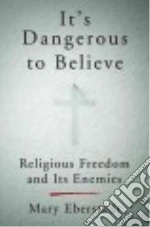 Title :
It's Dangerous to Believe
Title :
It's Dangerous to BelieveAuthor: Eberstadt Mary Publisher: HarperCollins Mary Eberstadt, “one of the most acute and creative social observers of our time,” (Francis Fukuyama) shines a much-needed spotlight on a disturbing trend in American society: discrimination against traditional religious belief and believers, who are being aggressively pushed out of public life by the concerted efforts of militant secularists. In It’s Dangerous to Believe, Mary Eberstadt documents how people of faith—especially Christians who adhere to traditional religious beliefs—face widespread discrimination in today’s increasingly secular society. Eberstadt details how recent laws, court decisions, and intimidation on campuses and elsewhere threaten believers who fear losing their jobs, their communities, and their basic freedoms solely because of their convictions. They fear that their religious universities and colleges will capitulate to aggressive secularist demands. They fear that they and their families will be ostracized or will have to lose their religion because of mounting social and financial penalties for believing. They fear they won’t be able to maintain charitable operations that help the sick and feed the hungry. Is this what we want for our country? Religious freedom is a fundamental right, enshrined in the First Amendment. WithIt’s Dangerous to Believe Eberstadt calls attention to this growing bigotry and seeks to open the minds of secular liberals whose otherwise good intentions are transforming them into modern inquisitors. Not until these progressives live up to their own standards of tolerance and diversity, she reminds us, can we build the inclusive society America was meant to be. € 23,20
|
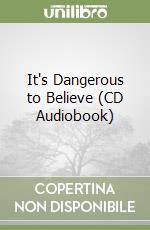 Title :
It's Dangerous to Believe (CD Audiobook)
Title :
It's Dangerous to Believe (CD Audiobook)Author: Eberstadt Mary, Winston Margaret (NRT) Publisher: Blackstone Audio Inc € 42,50
|
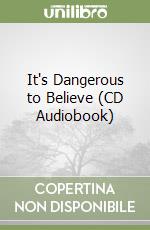 Title :
It's Dangerous to Believe (CD Audiobook)
Title :
It's Dangerous to Believe (CD Audiobook)Author: Eberstadt Mary, Winston Margaret (NRT) Publisher: Blackstone Audio Inc € 26,10
|
|
1914 |
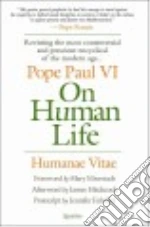 Title :
On Human Life
Title :
On Human LifeAuthor: Pope Paul VI, Eberstadt Mary (FRW), Hitchcock James (AFT), Fulwiler Jennifer (CON) Publisher: Ignatius Pr On Human Life, also known by the Latin name Humanae Vitae, made headlines worldwide. Everybody talked about the document when it was issued in 1968 but few people actually read. It is perhaps the most controversial document in modern Church history. Why? The advent of the birth control pill left many moralists wondering: could its use be reconciled with the two-thousand-year-old Christian teaching against contraception? After years of study and despite widespread expectations otherwise, the Catholic Church rejected the pill, as it had other forms of contraception, as contrary to God's purpose and therefore as harmful to genuine human good. On Human Life: Humanae Vitae is Pope Paul VI's explanation of why the Catholic Church rejects contraception. Paul VI referred to two aspects or "meanings" of human sexuality-the unitive and procreative aspects. Neither the person-uniting aspect (the unitive meaning) nor the person-begetting aspect (procreative meaning) may deliberately be separated from the other in the act of sexual intercourse, argued Paul VI, without acting against God's purpose and damaging the conjugal relationship. Paul VI also warned of the consequences if contraception became widely practiced-consequences that have since come to pass: greater infidelity in marriage, confusion regarding the nature of human sexuality and its role in society, the objectification of women for sexual pleasure, compulsive "family planning" and contraceptive policies by government, and the reduction of the human body as an instrument of human manipulation. Other dangers such as genetic engineering and human cloning are on the horizon. Greeted by a firestorm of opposition, On Human Life: Humanae Vitae greatly shaped debates in the Catholic Church. A movement of dissent emerged. While some Catholic leaders and others openly rejected Catholic teaching, others reaffirmed it and even developed it. St. John Paul II's popular "theology of the body" drew deeply on the insights of Paul VI. Pope Benedict and now Pope Francis have upheld the long-standing teaching. Indeed, a new generation of Catholics are embracing the truths of On Human Life: Humanae Vitae. "[Pope Paul Vi's] genius proved prophetic: he had the courage to stand against the majority, to defend moral discipline, to exercise a ‘brake' on the culture, to oppose [both] present and future neo-Malthusianism." € 9,20
|
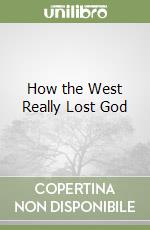 Title :
How the West Really Lost God
Title :
How the West Really Lost GodAuthor: Eberstadt Mary Publisher: Templeton Foundation Pr In this magisterial work, leading cultural critic Mary Eberstadt delivers a powerful new theory about the decline of religion in the Western world. The conventional wisdom is that the West first experienced religious decline, followed by the decline of the family. Eberstadt turns this standard account on its head. Marshalling an impressive array of research, from fascinating historical data on family decline in pre-Revolutionary France to contemporary popular culture both in the United States and Europe, Eberstadt shows that the reverse has also been true: the undermining of the family has further undermined Christianity itself. Drawing on sociology, history, demography, theology, literature, and many other sources, Eberstadt shows that family decline and religious decline have gone hand in hand in the Western world in a way that has not been understood before—that they are, as she puts it in a striking new image summarizing the book’s thesis, “the double helix of society, each dependent on the strength of the other for successful reproduction.” In sobering final chapters, Eberstadt then lays out the enormous ramifications of the mutual demise of family and faith in the West. While it is fashionable in some circles to applaud the decline both of religion and the nuclear family, there are, as Eberstadt reveals, enormous social, economic, civic, and other costs attendant on both declines. Her conclusion considers this tantalizing question: whether the economic and demographic crisis now roiling Europe and spreading to America will have the inadvertent result of reviving the family as the most viable alternative to the failed welfare state—fallout that could also lay the groundwork for a religious revival as well. How the West Really Lost God is both a startlingly original account of how secularization happens and a sweeping brief about why everyone should care. A book written for agnostics as well as believers, atheists as well as “none of the above,” it will permanently change the way every reader understands the two institutions that have hitherto undergirded Western civilization as we know it—family and faith—and the real nature of the relationship between those two pillars of history. € 15,20
|
|
1913 |
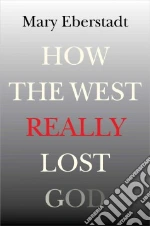 Title :
How the West Really Lost God
Title :
How the West Really Lost GodAuthor: Eberstadt Mary Publisher: Templeton Foundation Pr In this magisterial work, leading cultural critic Mary Eberstadt delivers a powerful new theory about the decline of religion in the Western world. The conventional wisdom is that the West first experienced religious decline, followed by the decline of the family. Eberstadt turns this standard account on its head. Marshalling an impressive array of research, from fascinating historical data on family decline in pre-Revolutionary France to contemporary popular culture both in the United States and Europe, Eberstadt shows that the reverse has also been true: the undermining of the family has further undermined Christianity itself. Drawing on sociology, history, demography, theology, literature, and many other sources, Eberstadt shows that family decline and religious decline have gone hand in hand in the Western world in a way that has not been understood before—that they are, as she puts it in a striking new image summarizing the book’s thesis, “the double helix of society, each dependent on the strength of the other for successful reproduction.” In sobering final chapters, Eberstadt then lays out the enormous ramifications of the mutual demise of family and faith in the West. While it is fashionable in some circles to applaud the decline both of religion and the nuclear family, there are, as Eberstadt reveals, enormous social, economic, civic, and other costs attendant on both declines. Her conclusion considers this tantalizing question: whether the economic and demographic crisis now roiling Europe and spreading to America will have the inadvertent result of reviving the family as the most viable alternative to the failed welfare state—fallout that could also lay the groundwork for a religious revival as well. How the West Really Lost God is both a startlingly original account of how secularization happens and a sweeping brief about why everyone should care. A book written for agnostics as well as believers, atheists as well as “none of the above,” it will permanently change the way every reader understands the two institutions that have hitherto undergirded Western civilization as we know it—family and faith—and the real nature of the relationship between those two pillars of history. € 22,30
|
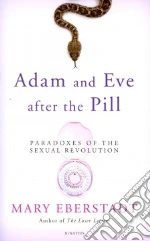 Title :
Adam and Eve After the Pill
Title :
Adam and Eve After the PillAuthor: Eberstadt Mary Publisher: Ignatius Pr Secular and religious thinkers agree: the sexual revolution is one of the most important milestones in human history. Perhaps nothing has changed life for so many, so fast, as the severing of sex and procreation. But what has been the result? This ground-breaking book by noted essayist and author Mary Eberstadt contends that sexual freedom has paradoxically produced widespread discontent. Drawing on sociologists Pitirim Sorokin, Carle Zimmerman, and others; philosopher G.E.M. Anscombe and novelist Tom Wolfe; and a host of feminists, food writers, musicians, and other voices from across today's popular culture, Eberstadt makes her contrarian case with an impressive array of evidence. Her chapters range across academic disciplines and include supporting evidence from contemporary literature and music, women's studies, college memoirs, dietary guides, advertisements, television shows, and films. Adam and Eve after the Pill examines as no book has before the seismic social changes caused by the sexual revolution. In examining human behavior in the post-liberation world, Eberstadt provocatively asks: Is food the new sex? Is pornography the new tobacco? Adam and Eve after the Pill will change the way readers view the paradoxical impact of the sexual revolution on ideas, morals, and humanity itself. € 14,80
|
|
2011 |
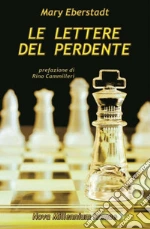 Title :
Le lettere del perdente. Un racconto comico sulla vita, la morte e l'ateismo
Title :
Le lettere del perdente. Un racconto comico sulla vita, la morte e l'ateismoAuthor: Eberstadt Mary Publisher: Nova Millennium Romae The Loser Letters č una satira epistolare del nuovo ateismo, in cui la protagonista, A.F. Christian, una ex cristiana, č una frizzante e mondana ragazza ventenne americana, un'entusiasta convertita all'inesistenza di Dio. Il libro č costituito dalle sue esuberanti lettere di ammirazione indirizzate ai nuovi atei, Dawkins, Hitchens, Dennett e gli altri. La protagonista cerca di evidenziare le carenze del loro movimento con l'intento di rafforzarlo. Poi, durante lo svolgimento della storia e del racconto della sua conversione, il lettore capisce che sta avvenendo qualcosa di diverso. € 12,00
Scontato: € 11,40
|
|
|
1910 |
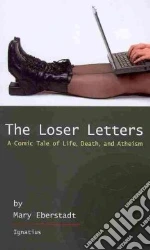 Title :
The Loser Letters
Title :
The Loser LettersAuthor: Eberstadt Mary Publisher: Ignatius Pr A wickedly witty satire, The Loser Letters chronicles the conversion of a young adult Christian to atheism. With modern humor rivaling that of the media lampooning Onion, found on college campuses all over America, A. F. Christian’s open letters to the “spokesmen of the New Atheism” explain her reasons for rejecting God and the logical consequences of that choice. Along the way she offers pithy advice to famous atheists such as Richard Dawkins and Christopher Hitchens, in the hope of helping them win over more Christians. “Of course we score big time with the young guys who aren’t responsible for anything, and don’t really care about anything besides spending most of their time in the basement playing video games and texting girls,” A.F. Christian points out. But what about all those serious, thoughtful people who are Christian believers? If the New Atheism is to make real headway, she argues, its advocates must do more to persuade intelligent theists living meaningful and fulfilling lives. Amid the many current books arguing for or against religion, social critic and writer Mary Eberstadt’s The Loser Letters is truly unique: a black comedy about theism and atheism that is simultaneously a rollicking defense of Christianity. Echoing C.S. Lewis’ Screwtape Letters and Dante’s Divine Comedy, Eberstadt takes aim at bestsellers like The God Delusion and God Is Not Great with the sexual libertinism their authors advocate. In her loveable and articulate tragic-comic heroine, A.F. Christian, Dawkins, Hitchens and the other “Brights” have met their match. € 12,90
|